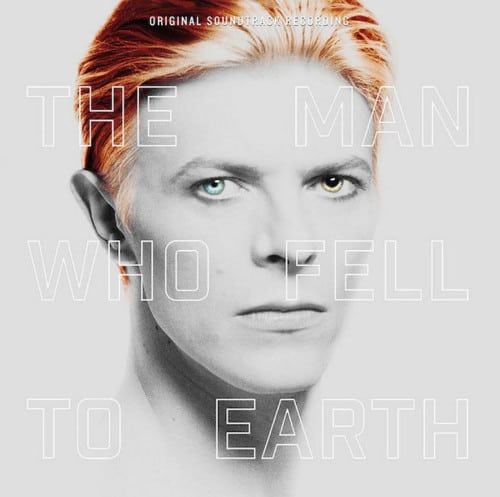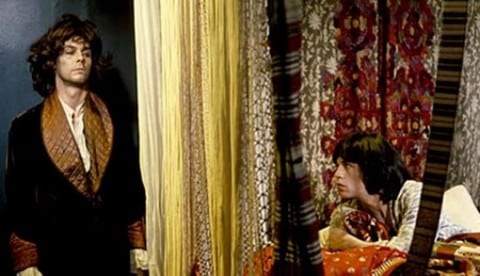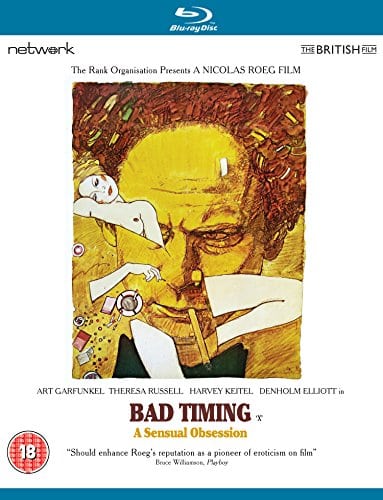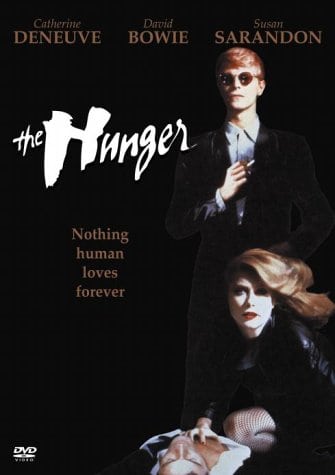It’s taken 40 years for a soundtrack album to The Man Who Fell To Earth to come out, the reasons always seeming to be unclear. David Bowie did originally write a score and some songs for use in the film, but director Nicolas Roeg instead asked John Phillips, of The Mamas and The Papas, to both write and collect together a huge array of songs and pieces of music from other sources. The large number of tracks heard in the film means that quite a bit of the music can be tracked down and found with ease, but us fans of the movie thought that we would never get to here, for example, that startlingly sad music that bursts out when Oliver Farnsworth is thrown out of that window, or that crazy rock introducing Nathan Bryce. However, a short while ago came the news that the original tracks had been located [forgive the cynic in me for remarking what a coincidence it was that they finally found these tracks soon after David Bowie had passed away], and I certainly jumped up and down with excitement. It was just as exciting when the CD was popped through my letterbox, though the release is actually rather problematic and will probably both disappoint and confuse many.
The music is,of course, fantastic. While two of the greatest pieces of Gustaz Holst’s awesome The Planets suite – the throbbing, martial Mars, The Bringer Of War, and the ethereal, beautiful Venus, The Bringer Of Peace – are included, the rest of the music leans towards the pop world rather than conventional film scoring. One thing that really surprised me is how much music for the film Phillips actually wrote, me assuming that some of the most distinctive tracks heard in the film actually came from other hands. Some songs such as Boys From The South and Bluegrass Breakdown are quite recognisable as coming from him, but the variety of his instrumental pieces is quite remarkable, from the virtually ambient electronica of Space Capsule to the melancholy evening blues of, well, Jazz to the more upbeat jazz of Alberto to, yes, the music for that window scene, entitled, well, what else but Window. It all shows off Phillip’s diversity as a composer, though I will say that most of his tracks last under two minutes, something which was obviously necessitated by most of the scenes in the movie being short too, but which may annoy some. Also, the song Hello Mary Lou is replaced by an instrumental version of the tune.
Still, so far so good, and the Phillips pieces make an interesting comparison with the six tracks from Stomu Yamashta, the innovative Japanese musician who fused prog rock with traditional Japanese percussion. Not actually written for the film, his tracks tend to be quite long, and use this length to develop and even change styles. Poker Dice, which is actually the piece first heard in the film, begins with a single repeated piano note backed by eerie percussive effects and gets more and more exciting as increasingly frenetic keyboard improvisation plays over ever louder drum beats. Memory Of Hiroshima, employed during the scene where Mary-Lou discovers Newton is an alien, employs a similar structure but with a more conventional, guitar-led rock mode, Wind Words, used during the first love montage, is an almost insanely beautiful piece where both a violin and even a keyboard seem to musically weep a simply divine melody, and 33 ½ and One Way are orgies of percussion full of strange effects which perhaps outstay their welcome a little but which are still highly interesting. And then, in addition to the compositions of Phillips and Yamashta, are three fine songs from Louis Armstrong, Genevieve Waite and the Kingston Trio, whose charming song of nostalgia Try To Remember is briefly heard during the poignant bit in the film where Newton remembers how life on his home planet used to be before the drought started.
So the music is, by and large, terrific. However, my praise will stop here. The music not being presented in the order heard in the film isn’t a big deal. The fact that there’s still much music missing wouldn’t be a big deal either – it’s understandable that they didn’t want to release a three CD set – if it wasn’t for the fact that the first CD runs for 51.30 long and the second 35.07, which means that there was room for over 40 minutes more music. Surely the piece heard during the end titles, a trumpet instrumental of the song Stardust, could have been included, especially as it’s already available elsewhere? Even more infuriating is that two tracks – Bryce and the vocal version of Hello Mary Lou [you know, the one actually heard in the film] – are apparently only available in the forthcoming Collector’s Edition Blu-ray release but not here. It doesn’t affect me personally, as I’m buying the Blu-ray anyway, but it’s quite devious, especially considering that there was easily enough room to include them on the CD set which also has at three pieces, including a shoddy vocal version of Window, that aren’t even heard in the film at all.
It gets worse. Some tracks are arranged differently to their film counterparts, notably Window where the guitar rather than the wordless vocal takes up most of the tune, and Alberto where an extra trumpet is easily distinguishable. For God’s sake, we’ve been waiting for this music long enough, so why can’t we hear what’s in the film? And, worse of all, the Yamashta track Mandala doesn’t even include the part of the piece that’s heard in the film! That’s right, you hear several minutes of music which doesn’t appear in the movie, then the piece is faded out before that haunting flute music that accompanies Newton thinking of his dying planet and family, and is heard several times so counts as a major musical theme in the film, comes along. OK, the full piece can be obtained by buying the Yamashta album it came from [though it’s not easily found cheap], something which I did about a year ago, but it’s outrageous the way it’s been presented on this album and a totally baffling decision that, along with some of the other issues, makes me wonder if this release was assembled by people who had either not seen the film or who just didn’t care. Some explanatory notes would have been nice too, but that was obviously too much trouble, and us fans are still left with quite a few questions concerning the music.
We should be thankful that a soundtrack to The Man Who Fell To Earth has come out at all, and there is a lot of great stuff on this double CD release. But it’s in no way a definitive release and they should have really done a whole lot better. I know that we can all now compile our versions very easily, buy that’s not really the point is it? Maybe for the film’s 50th Anniversary they’ll have another go at it….
Rating: 









CD 1
01 – Poker Dice by Stomu Yamashta
02 – Blueberry Hill (Single Version) by Gordon Jenkins Orchestra And Choir and Louis Armstrong
03 – Jazz II by John Phillips
04 – The Planets, Op. 32 Venus, The Bringer Of Peace by Bournemouth Symphony Orchestra and George Hurst
05 – Boys From The South by John Phillips
06 – 33 1/3 by Stomu Yamashta
07 – Rhumba Boogie by John Phillips
08 – Try To Remember by The Kingston Trio
09 – Mandala by Stomu Yamashta
10 – America by John Phillips
11 – Wind Words by Stomu Yamashta
12 – Jazz by John Phillips
CD 2
01 – One Way by Stomu Yamash’a
02 – Space Capsule by John Phillips
03 – Bluegrass Breakdown by John Phillips
04 – Desert Shack by John Phillips
05 – Memory Of Hiroshima by Stomu Yamash’a
06 – Window by John Phillips
07 – Alberto by John Phillips
08 – The Planets, Op. 32 Mars,The Bringer Of War (Excerpt) by Bournemouth Symphony Orchestra and George Hurst
09 – Liar, Liar by John Phillips
10 – Hello Mary Lou by John Phillips
11 – Silent Night by Queen’s Hall Light Orchestra & Robert Farnon
12 – Love Is Coming Back by Genevieve Waite and John Phillips






Be the first to comment